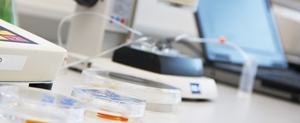May 19 2014
A new partnership between Dublin City University and the Australian Research Council Centre of Excellence for Electromaterials Science (ACES) has formed to create advanced, wearable medical devices.

Examples of the technology being developed include wristwatches that can monitor the composition of sweat and smart textiles that sense movement in limbs or variations in body chemistry for applications in sports, personal health, rehabilitation or medical therapeutics.
Further strengthening a twenty year collaborative relationship, DCU will become a new partner of the world leading materials research group ACES as the centre moves into a new phase of AUD$25million funding through the Australian Government.
“The partnership will leverage Dublin City University (DCU) strengths in sensing technologies to translate research into functional 3D Printed devices for medical applications with real socio-economic impact,” said Professor Dermot Diamond, director of the National Centre for Sensor Research at Dublin City University.
Described as BioPrinting, the process of 3D printing devices compatible with the human body is an area of expertise of the ACES group in Australia. The ACES-led organisation, the University of Wollongong, houses a world class fabrication facility and boasts internationally renowned experts including DCU graduate Dr Stephen Beirne.
“We are excited to be able to take our collaborative research with DCU to a new level as ACES enters a new phase of funding that allows us to develop new dimensions in our reseach, training and social engagement programs,” said ACES Director, Professor Gordon Wallace.
“World class 3D printing facilities are a tremendous catalyst to forge world class collaborative research programs that can tackle complex multidiscipline research challenges.”
The results of the partnership will include production of intelligent monitoring systems for both wearable and implantable devices.